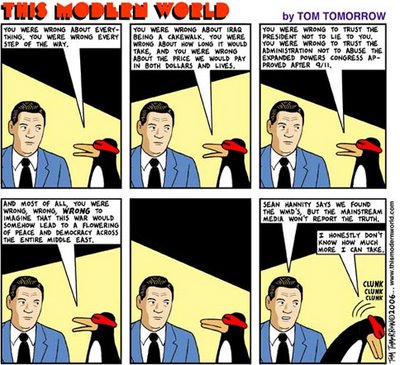Run, do not walk, over to MSNBC to see Keith Olbermann's blog in which he hoists Don Rumsfeld on several simultaneous petards. The video from his show tonight is supposedly even more spectacular but, as a print guy from way back, the Slangwhanger-in-Chief will limit his encomium to the non-multimedia extravaganza that is text.
The most epochal event in world politics since the cold war has occurred - and few people have noticed. I am not referring to the conflict in Iraq or Lebanon or the campaign against terrorism.
It is the utter and final defeat of the movement that has shaped the politics of the US and other western democracies for several decades: the libertarian counter- revolution.
Between the 1930s and 1960s, the US and other liberal democracies adopted their own versions of modern welfare state capitalism. By the mid-20th century, in every western democracy, the legitimacy of the welfare state was accepted by mainstream parties of the right as well as the centre and left. But not by the libertarians. Unlike Eisenhower, Nixon and other "modern Republicans", America's libertarians did not seek a more fiscally responsible welfare state. They wanted to abolish the welfare state altogether and replace it with an "opportunity society" or "ownership society". They were revolutionaries - or more precisely, counter-revolutionaries, seeking to restore an idealised Victorian world of laisser faire capitalism.
The libertarians launched a massive intellectual and rhetorical assault on modern government from the 1970s onward. Their formidable forces included influential economists such as Milton Friedman, the Nobel Prize winner, and Martin Feldstein, who chaired Ronald Reagan's Council of Economic Advisers; think-tanks such as the Cato Institute; and affluent pressure groups such as the Club for Growth and Americans for Tax Reform, whose leader, Grover Norquist, famously said that government should be shrunk until it can be drowned in a bathtub.
Libertarians proposed to privatise Social Security, replacing government pensions with individual savings accounts. Healthcare, too, would be provided by individual "health savings accounts". Public education, a legacy of the 19th century, was another target of the libertarian counter-revolutionaries, who proposed giving citizens vouchers for private schools. The libertarians also targeted labour market regulation, calling for abolition of the minimum wage. This would be combined with mass immigration, which would drive down wages further.
In the mid-20th century, welfare-statism was the "third way" between democratic socialism on the left and big-government conservatism that accepted the welfare state but sought to limit its costs. But in the 1970s and 1980s, the political spectrum shifted to the right. Not only communism but also democratic socialism vanished as plausible options because people no longer believed that the nationalisation of whole economies made any sense. At the same time, moderate conservatives who had made their peace with the welfare state were outflanked on the right by the radical libertarians.
Suddenly the former political "centre", social democratic welfare-state capitalism, was redefined as the "left" and the former "right", big-government conservatism, was now considered the "centre". In the 1990s, the term "third way" meant, not Swedish social democracy, but the pro-market "neo-liberalism" of Bill Clinton and Tony Blair, which would have been considered moderate conservatism in the 1950s . In the US, the Democratic Leadership Council echoed the free-market, small-government rhetoric of the libertarian radicals. "The era of big government is over," Mr Clinton declared. But he spoke too soon. In the past decade, the US public has rejected every element of the libertarian counter-revolution. The first proposal voters rejected was the privatisation of schooling. Because US education policy is dominated by states and cities, this issue was fought at the local level. It turned out that most conservative Republicans as well as Democrats were content with their suburban public schools. Again and again, voucher proposals went down to defeat.
President George W. Bush made Social Security privatisation a central part of his legislative agenda. Americans, alarmed by the stock market slide, rejected the idea and frightened Republican politicians dropped it. Neither has the Bush administration exerted itself over another libertarian proposal, health savings accounts, which almost certainly would be rejected by risk-averse voters. Indeed, to the horror of libertarians, Mr Bush and the Republican Congress created the prescription drug programme for the elderly, the biggest expansion of socialised medicine in the US since Lyndon Johnson presided over the creation of Medicare in 1965.
And the labour market? Here again, the libertarians have been completely routed. Against libertarian opposition, Congressional Republicans recently sought an increase in the minimum wage, coupled with cuts in the estate tax. And against libertarian opposition, swelling popular demand for an end to illegal immigration has forced both parties to support measures to police America's chaotic borders.
For nearly a decade, the Republican party has controlled Washington and most state legislatures. And yet every big proposal of the libertarians has been rejected by the public and their elected representatives. Their only temporary achievement has been tax cuts, which are likely to be rolled back at least in part to reduce the deficit in the years ahead. With the disappearance as a significant force of the libertarian right, the centre of gravity inevitably will shift somewhat left in matters of political economy. But we will not see a restoration of the mid-20th century pattern because there will be no revival of the socialist left. The demise of both socialism and libertarianism pretty much limits the field to moderate social democracy and big-government conservatism. The limitation of options on the horizontal left-right spectrum is accompanied, however, by a growing vertical, top-bottom divide between an elite committed to globalisation and mass immigration and a populist, nationalist majority. If this replaces the older horizontal left-right divide, then we may see a third, "third way" - one which positions itself between the crudest forms of populism and utopian forms of transnationalism.
The libertarian moment has passed. It will not come again, and its defeat as a force in US politics will change the definitions of right, left and centre - not just in the US but also, the world.
--The writer is senior fellow at the New America Foundation and author of The American Way of Strategy (Oxford University Press, forthcoming October 2006)







